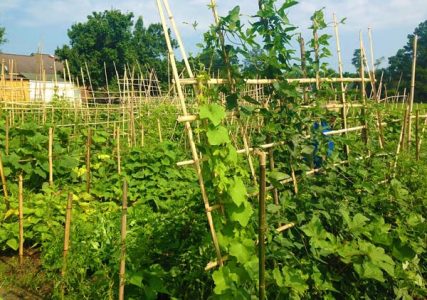
When some immigrants and refugees move to the United States, they come with no more than a suitcase. Entering a culture that’s often times so profoundly different than their homeland, many struggle with transition – right down to finding food they’re accustomed to eating.
“There’s a lot of literature that shows immigrants come to this country with better health outcomes and these outcomes decline as they’re here longer and begin adopting Western diets,” said Dara Bloom, an NC State University Assistant Professor and Extension Specialist focusing on local food. “We want to build their capacity and access to resources for a healthier lifestyle.”
With a seed grant from NC State’s Office of Outreach and Engagement, Bloom plus other NC State faculty members Annie Hardison-Moody and Michael Shulman launched a pilot program among three immigrant communities in the Raleigh area: a Latino community connected with a local church, a women’s group from a local mosque and a community of Karen refugees.
The team focused on how to support each community by first getting to know each community’s needs, desires and assets. When all three communities expressed interest in a community garden, the team started making connections to existing local food resources.
“We’re facilitators,” Bloom said. “The biggest signal of success [for these projects] is being able to make connections and step away. You want people to be connected with larger organizations and be able to access resources on their own.”
The team connected the mosque with Wake County Cooperative Extension agents and Master Gardeners, who helped improve the mosque’s garden beds, introduced compost and hosted workshops on container gardening so that participants would know how to grow food at home. Home gardening workshops are also planned for the Latino community.
Among the Karen, the breakthrough connection was with a local nonprofit that had urban farmland available. The grant funding bought farming supplies and paid local people from within the Karen community to help translate materials and coordinate community members.
“A lot of the Karen were in refugee camps for years, and their love and their passion is being able to grow food – particularly varieties that are hard to find [in stores]. Community leaders told us, ‘If you can give us land and water, we’ll do everything else,’” she said.
When team members evaluate the pilot projects later this year, they hope lessons learned can be integrated in new resources and trainings offered by Cooperative Extension.
Bloom’s recent work has also focused on increasing local food availability at Wake County childcare centers in collaboration with Wake County SmartStart, Advocates for Health in Action, Wake County Cooperative Extension, NC State graduate student Jacob Rutz and the support of the John Rex Endowment. She also trains Cooperative Extension agents in strategies for increasing community-based local food access among low-resource consumers, is developing a statewide volunteer network of local food experts and researching strategies to reduce food waste on farms by creating supply chains for aesthetically imperfect produce. A 2012 report from the Natural Resources Defense Council estimates that 40 percent of food in the United States is wasted.
“That’s probably an underestimate,” Bloom said. “Some farms will plow under a crop if the market price isn’t worth the cost of the labor [to pick the produce], and a lot is lost at the farm level due to supermarkets’ strict aesthetic standards.”
More research needs to be done, and with a small grant from the College of Agriculture and Life Sciences Dean’s Big Ideas Innovation Fund, Bloom and colleagues Nancy Creamer, Rebecca Dunning and graduate student Lisa Johnson have the opportunity to pursue the concept for future research possibilities and grant funding.